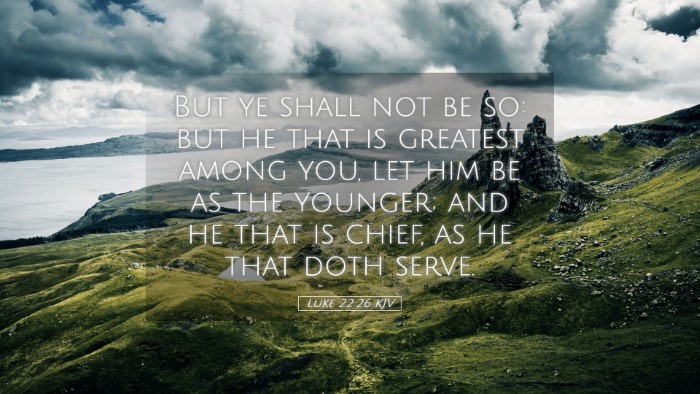Commentary on Luke 22:26
Luke 22:26 states, "But you are not to be like that. Instead, the greatest among you should be like the youngest, and the one who rules like the one who serves." This verse is a call to humility and service in the context of leadership within the Christian community.
Introduction
This verse is nestled within a pivotal moment in the Gospel of Luke, occurring just before Jesus’ arrest and crucifixion. The discourse centers on the nature of true greatness in the kingdom of God, which contrasts sharply with worldly expectations. Drawing from various public domain commentaries, we seek to elucidate the deeper meaning of this verse for pastors, students, theologians, and Bible scholars.
Contextual Analysis
Jesus addresses His disciples in a moment of tension concerning leadership roles and ambitions. The preceding verses reveal disputes among the disciples about who among them would be considered the greatest (Luke 22:24).
Matthew Henry notes that the ambition for greatness among the disciples reflects a common human desire for recognition and honor. He emphasizes that Jesus responds to this strife by redefining what it means to be great in God’s kingdom: it is found not in authority but in servanthood.
Albert Barnes highlights that Jesus contrasts earthly standards of greatness with divine principles. He illustrates that the paradigm of leadership in the kingdom is inverted; the one in authority must adopt the posture of a servant, encouraging leaders to view their roles as opportunities to serve rather than to dominate.
Theological Implications
The theological weight of this passage cannot be overstated. Adam Clarke elaborates that true greatness in the sight of God is found in humility, as demonstrated by Christ Himself. He points to the life and mission of Jesus, who came not to be served but to serve, a principle that undergirds Christian discipleship.
- Servanthood as Leadership: The call to serve reflects the heart of Jesus’ ministry and challenges traditional views of authority.
- The Youngest vs. The Greatest: Jesus’ instruction to be like the youngest suggests a reversal of societal norms, where vulnerability and humility are valued above status.
- Christian Community: This verse serves as a vital reminder to the Christian community about the nature of relational dynamics within the church.
Exegesis of Key Terms
The key terms in this verse warrant deeper exploration. The term "greatest" (μείζων, meizōn) speaks to prominence and distinction typically associated with honor. In juxtaposition, "youngest" (νεώτερος, neōteros) signifies someone of lesser status, often overlooked in ancient cultural contexts.
Barnes elucidates that Jesus’ intention is not to undermine authority but to shape it according to His example. Christian leaders are called to embrace positions of influence as opportunities to reflect Christ’s love and humility.
Practical Application
This passage not only informs theological understanding but also offers profound implications for practical ministry.
- Leadership Training: Pastors and church leaders should emphasize the importance of servanthood in their training programs, preparing future leaders to lead with humility.
- Community Engagement: Churches should engage in community service as a means to model Christ’s servanthood, demonstrating love in action.
- Conflict Resolution: When conflicts arise about status within the church, revisiting this passage can guide discussions towards a shared commitment to serving one another.
Conclusion
In conclusion, Luke 22:26 offers a radical redefinition of greatness through the lens of servanthood, challenging both leaders and congregants to embrace humility. The insights drawn from public domain commentaries illuminate the transformative nature of Jesus’ teachings, holding profound significance for the church today. As we reflect on this verse, may we be empowered to serve in love, embodying the very heart of Christ in all that we do.


